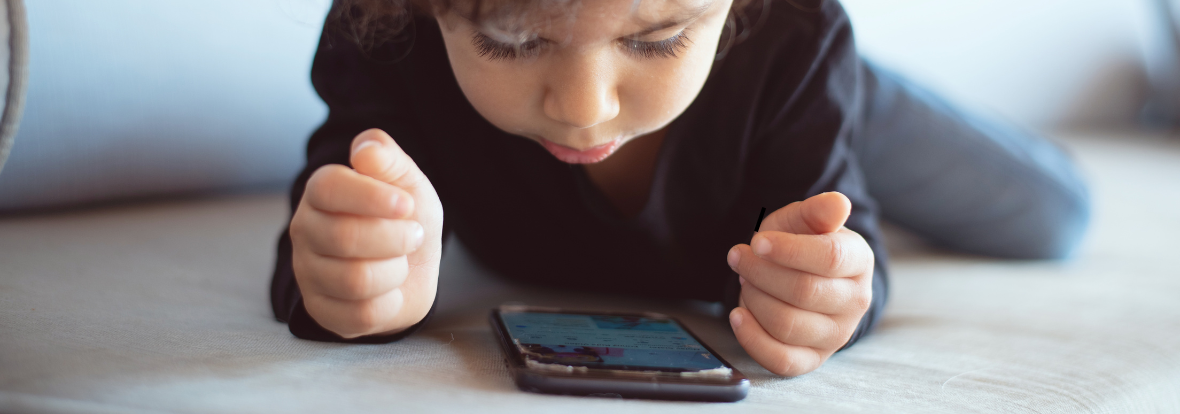What Should Be The Right Screen Time By Age?

It’s funny, but today, children see more screens than trees around them. Screens are not just in our homes but also in public spaces, and we intuitively know how to use them to get information. This is great for our digitally native children, but have you wondered how all this screen time might affect them? The Babilou Family has dug into the latest research and compiled some handy guidelines to help you navigate the screen-filled world with your children. Let’s dive in!
Our Goals
First things first, why are we doing this? We want to bring together the best research from around the world to give you clear, practical advice on screen use for children by age. We aim to create guidelines that work across different cultures, support you as parents, and offer tips for professionals working with young children.
How We Did It
We didn’t just pull these guidelines out of thin air. We reviewed studies from top organizations like the WHO and UNICEF, interviewed experts, and even took a deep dive into a certified online course in France about screen risks and guidelines. We also chatted with education leaders and experts to make sure we’re covering all the bases.
The Big Picture on Screen Time
Let’s talk numbers. In 2021, French households had an average of six screens each. Over a quarter of children watch screens for more than an hour every day. For the littlest ones (0-3 years old), it’s about three hours a day, and for those aged 3-6, it’s around 3.5 hours.
And this exposure has sobering effects. Too much screen time can delay language development, increase BMI in 2-year-olds, and cut into their sleep. Plus, having the TV on in the background can mean your child hears 13,400 fewer words per week, which isn’t great for their language skills. And yes, it’s even affecting their eyesight, with childhood myopia on the rise.
How Screens Affect Little Brains
Here’s an incredible fact: children’s brains grow super-fast in the early years, forming up to a million neuronal connections every second. Especially for babies in the first year of life, these connections are strengthened when children have interactions with their trusted caregivers, known as “Serve and Return.” But screens don’t provide the right kind of stimulation. Babies need real, three-dimensional interaction and feedback.
The problem isn’t just when a baby sees a screen; it’s also when an adult is focused on a screen in the presence of a child who is craving interaction. When you’re glued to your phone, your child might feel like they’re talking to a wall, which isn’t great for their emotional and social development.
Children learn by touching, moving, and exploring. Screens encourage them to sit still, which isn’t good for their development. That’s why it’s crucial to limit screen time and encourage active play instead.
Not everyone agrees on screen impacts. Some experts think public health messages don’t reflect the real-life integration of technology. But there’s one thing everyone agrees on: too much screen time can delay language development. Given the risks, we recommend being extra careful with screen time. Better safe than sorry, right?
For children Aged 0-3
No screens for babies under two, or until they’ve developed strong language skills. For 2-3-year-olds, keep screen time to a minimum (30 minutes a day) and always supervise. We believe screen time could actually benefit children if it is a co-watching time where you and your child together enjoy screen time. Encourage movement and interactive play over screen time. Avoid unsupervised use entirely.
Think of screens like alcohol—not for toddlers! No guilt needed for keeping your phone away from them. Turn off background TV to avoid passive exposure. Remember, real-life interactions are irreplaceable by any app or technology.
For children Aged 3-6
For your preschoolers, keep screen time to no more than an hour a day, and make sure you’re watching with them. Treat screens like a tool for shared activities rather than a babysitter. Choose one device for your child to use and keep it simple with short cartoons or easy-to-watch content. Avoid online games; board games are way more fun! Create screen time rituals to help your child understand when it starts and ends. Remember these golden rules: no screens in bedrooms, no screens before school, no screens during meals, and no screens before bedtime.
Be intentional with screen time. Understand that it can affect sleep and eating habits, and make sure you watch together to make it more engaging. Today, all phones and devices have screen time monitoring apps. Use these apps to monitor screen time and content, and analyze your use of screens as a family, setting intentional limits. Lead by example by managing your own screen use. Most importantly, as your child’s digital guardian, it’s crucial to protect your child’s identity on social media and ensure their data is safe.
For Professionals in Early Childhood Education
For those working with young kids, use technology to enhance learning, not just for the sake of it. Educate yourself and teach children about safe browsing, internet safety, and the dangers of cyberbullying. You can also use an array of tech to support your work without directly involving the children.
May Zalat, Head of Education at Blossom Nurseries shares, “Our educators prioritize hands-on coding experiences over digital screens. Children, especially our 3-5-year-olds at the Innovation Lab in Al Barsha 3, engage in collaborative problem-solving through play, experimentation, and teamwork. We emphasize interaction and collaboration, believing these are key to fostering creativity and critical thinking. To support parents in reducing screen time at home, we offer alternative activity suggestions and share research highlighting the importance of limiting screen exposure for young children”.
Wrapping It Up
Managing screen time for young kids is a crucial part of modern parenting. By following these guidelines, you can ensure your child uses screens safely and beneficially, supporting their healthy development. The Babilou Family’s approach gives you a solid framework to integrate screens thoughtfully into your child’s life. Keep it balanced, keep it fun, and most importantly, keep it safe!

Sridevi Raghavan
Member of the Babilou Family since the integration of the Amelio Early Education daycare network that she founded in India in 2008, Sridevi Raghavan will devote her extensive experience to her mission: to create an extremely innovative educational curriculum combining the contribution of neurosciences to the great pedagogies of the 21st century.











Sridevi Raghavan
December 27, 2025